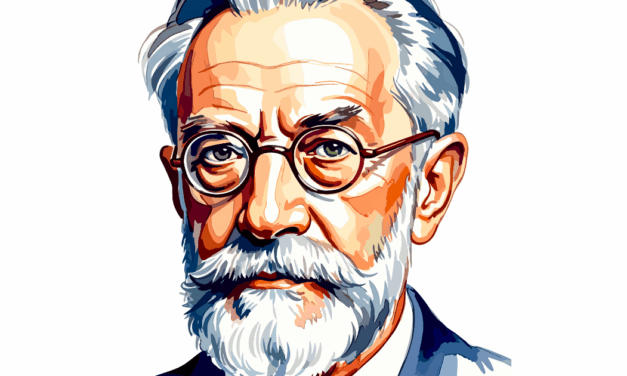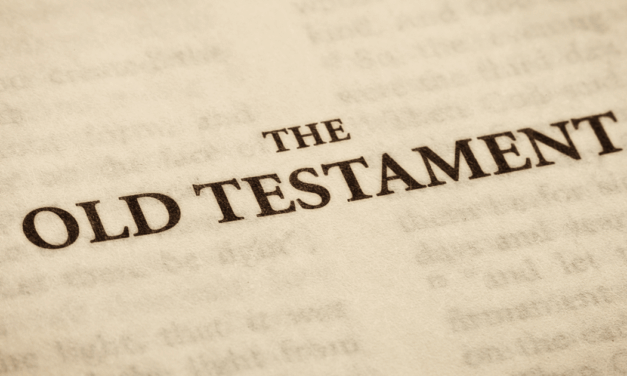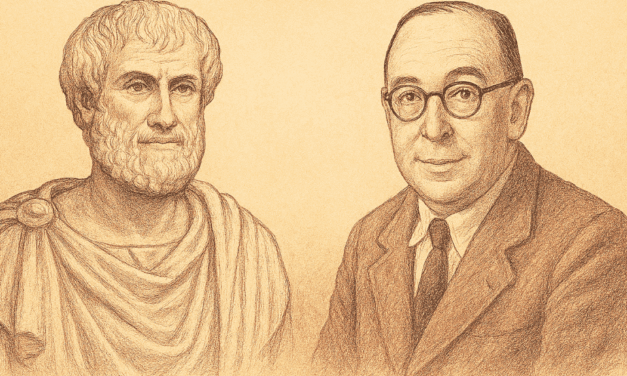Cultural Apologetics Column
This article was published exclusively online in the Christian Research Journal, volume 48, number 01 (2025).
When you support the Journal, you join the team and help provide the resources at equip.org that minister to people worldwide. These resources include our ever-growing database of more than 2,000 articles, as well as our free Postmodern Realities podcast.
Another way you can support our online articles is by leaving us a tip. A tip is just a small amount, like $3, $5, or $10, which is the cost of a latte, lunch out, or coffee drink. To leave a tip, click here.
[Editor’s Note: This review contains spoilers for Dune: Prophecy.]
Dune: Prophecy
Developed by Diane Ademu-John and Alison Schapker
Executive Producers: Diane Ademu-John, Alison Schapker, Jon Spaihts, Scott Z. Burns, Matthew King, John Cameron, Brian Herbert, Byron Merritt, Kim Herbert, Jordan Goldberg, Mark Tobey, Anna Foerster, and John Shiban
Producers: Kevin J. Anderson, Bryan H. Carroll, and Angela LaManna
Legendary Television
Streaming on HBO (2024– )
TV–MA
Few franchises have left as deep an imprint on the science fiction genre as Dune. Frank Herbert’s original 1965 novel was steeped in political intrigue, philosophical musings, and religious iconography, and continues to shape the genre even today. Denis Villeneuve’s 2021 film adaptation and its 2024 sequel brought the venerated story to the big screen for an entirely new generation, sparking a renewed interest in the property that Legendary Television now seeks to capitalize on with the streaming series Dune: Prophecy (2024– ).
Set 10,000 years before the events of the original novel and its film adaptation, Dune: Prophecy aims to expand the universe, focusing on the secretive Bene Gesserit order, the matriarchal sisterhood that appears in the novel and the film, whose shadowy influence has shaped the fate of empires. For Christians looking to engage in cultural apologetics, Dune presents both challenge and opportunity. Herbert’s strange fusion of mysticism, genetic determinism, and prophetic manipulation provides a lot of fodder for conversation, even if Herbert’s own presuppositions about religion in general are at odds with orthodox Christian teachings.1 And Dune: Prophecy provides viewers the opportunity to engage (or re-engage) with fans of the series on a level beyond that of the popular films.
Before jumping in, however, it bears mentioning that the series is rated TV–MA and includes a handful of explicit scenes across a number of episodes. These scenes can be skipped over without losing much exposition or context, but this is absolutely not a show for children and does not promote itself as such. Even teenagers who might be fans of the films need not look at this series due to the nature of the TV–MA rating—discerning potential viewers should consider this series firmly “rated R.”
Before the Story. Dune: Prophecy draws upon the Great Schools of Dune book trilogy penned by Brian Herbert and Kevin J. Anderson and released between 2012 and 2016.2 Though set after the events of this trilogy, the show is nevertheless indebted to the “worldbuilding” of that book series, even more so than it is indebted to Herbert’s original Dune books.3 The histories of the famed Harkonnen and Atreides families are explored, as are the origins of the Bene Gesserit Sisterhood.
At the heart of the story is Valya Harkonnen (Emily Watson), the ambitious Mother Superior, who is determined to solidify the Sisterhood’s control over political affairs in the galaxy, ensuring that it is their guidance that shapes the future of the Imperium. Alongside her is Tula Harkonnen (Olivia Williams), her sister, a trusted Reverend Mother who plays a key role in executing the Sisterhood’s long-term plans.
Padishah Emperor Javicco Corrino (Mark Strong) rules over the Imperium with the weight of history on his shoulders, while the marriage of Corrino and Empress Natalya (Jodhi May) was as much a political move as a relational one. Next in line for the throne is Princess Ynez (Sarah-Sofie Boussnina), under pressure and scrutiny as the heir to the Golden Lion Throne.
As the Sisterhood operates in the shadows, they face unexpected opposition in the form of Desmond Hart (Travis Fimmel), a battle-hardened soldier with mysterious abilities who emerges as a kind of wildcard in the political landscape, seeking to gain the trust of the Emperor at the expense of the Bene Gesserit. Meanwhile, Keiran Atreides (Chris Mason), Swordmaster of House Corrino, finds himself drawn into the palace intrigue, while Mikaela (Shalom Brune-Franklin), a Fremen woman who serves the royal family, works to gather intelligence on behalf of the Sisterhood secretly.
All of these characters and more are juggled across six episodes full of hushed conversations and clandestine conspiracies punctuated by brief bursts of shocking, brutal violence. Following up on his interviews with the cast and crew, film critic Steven Prusakowski characterizes the series as a “chess match” about “intricate power struggles, profound revelations, and the shifting tides of truth and lies,” themes that “resonate with not just our contemporary world but also with the entire sweep of human history.”4
Politics and the ease with which truth can be twisted are central ideas the series plays with — and this is intentional. Executive Producer Jordan Goldberg, in the aforementioned interview, remarks, “Yeah, we have a lot of political intrigue in our show when we have a lot of people trying to control things.” Fimmel, who plays Desmond Hart, fleshes out that idea when he notes, “You don’t know what to believe. I like the games that are played in scripts. It’s a big chess match. It’s one big riddle.”5
Given the current cultural climate, it should be no surprise that Dune: Prophecy leans heavily into themes of political maneuvering, deception, and the battle for ideological supremacy. In an age when information is stored in invisible clouds and weaponized as needed, and narratives seem to receive constant revision, the series feels particularly timely. The idea that truth is malleable, or that those in power dictate reality, is a recurring motif in Dune that undoubtedly has lent it even more cultural cachet today. This series leans heavily into all these ideas as the Bene Gesserit play a long game of quiet control, bending history and belief systems to serve their own ends, raising questions about the cost of such tactics. Does the pursuit of stability justify deception? Can any individual or group be trusted to guide history from the shadows without corruption? These are the kinds of ethical dilemmas at the forefront of the series.
Truth in a Post-Truth Age. For Christian viewers looking to engage in cultural apologetics, Dune: Prophecy provides some compelling opportunities to reflect on the nature of truth in an era increasingly defined by relativism and ideological power struggles. Recent scholarship has identified the age in which we find ourselves as “metamodern,” the next evolutionary stage of the philosophical zeitgeist after “modernity” and “postmodernity.”6 Jonathan Rowson, writing on the subject, characterizes metamodernism as “a feeling, and all that constitutes the feeling and flows from it….feelings are far from trivial — they have cosmological significance.”7 It is the blending of modern sincerity with postmodernist irony, an alternative construct to modernity’s trademark certainty and postmodernity’s insufferable cynicism that oscillates between the two extremes because people have feelings that are subjective and change often and are valid because they are feelings and feelings have “cosmological significance.” It is also a very obtuse way of saying that people are often confused.
The metamodern embrace of ambiguity and emotional resonance is, in many ways, a natural fit for the Dune franchise. The new series revels in the idea that truth is contingent — constructed by those with the knowledge and means to shape perception. “Truth is like a currency,” Emily Watson noted. “And he who controls that narrative controls the power in the universe. And it’s ultimately all down to…the Dune equivalent of oil is spice, and he who controls the spice controls the universe.”8 This is, of course, the Bene Gesserit’s modus operandi. Their influence does not derive from brute force but from a carefully curated reality — one in which prophecy (the driving force behind religious belief, as will become obvious in Dune) is not foretold so much as it is engineered, where “divine revelation” is indistinguishable from calculated deception.
This should not be surprising in a cultural moment where ideological narratives are often privileged over objective reality. The metamodern ethos, with its flip-flopping between sincerity and irony, allows such contradictions to coexist. One can, somehow, believe in absolute truth while simultaneously acknowledging that truth is a construct of power dynamics. It is not that truth ceases to exist but that its meaning and application are perpetually in flux. The Bene Gesserit, then, are an apt, dark mirror reflection of the epistemological fluidity that dominates the current age.
If what you are thinking is that metamodernism is, in effect, a kind of moral relativism 2.0, you would not be off base. Postmodernity was so cynical it doubted itself, acknowledging its own relativism. But the danger of metamodernism is that it risks normalizing contradictions, as if they are inherently good because feelings occupy the frontal lobe. It is intellectual incoherence in the guise of “nuanced thinking” that thrives on uncertainty and erodes the fields that require clear epistemic foundations (science, law, ethics…you see where this is going?), walking hand-in-hand with neoliberalism, which just loves a flexible ideological framework.9
If truth is constantly fluctuating between belief and skepticism, then it comes down to good ol’ fashioned common sense to point out that it becomes quite difficult to determine what is actually real. In the age of “deepfakes” and “misinformation” and “conspiracy theories,” it creates a challenge for people to take anything seriously. “Do they mean it or not?” becomes an unresolvable question that can only be left up to the interpretation of the person who feels strongly one way or the other — evidence be damned. Genuine conviction, therefore, becomes an impossibility, and all beliefs become subject to ironic reinterpretation — leading to something that even remotely resembles a deep and personal commitment (i.e., faith) being seen as naïve. “Everything is both true and false” is a great way to disengage people from meaningful struggles and puts us firmly in the territory of widespread epistemological dialetheism.10
Historic, orthodox Christianity does not embrace the idea that truth is an evolving construct, nor does it treat belief as something contingent upon cultural shifts, ideological fads, or political expediency. If it did, it probably would not have made it out of the second century. Christian epistemology is contingent upon the concept of objective truth — that truth exists independently of human perception, emotion, or manipulation. This is, perhaps, the most fundamental clash between the system of thought represented by the Bene Gesserit and a Christian understanding of reality. The Bene Gesserit operate under the assumption that prophecy and belief can (and should) be manufactured, that history can be controlled, and that religious conviction is ultimately a tool to be wielded rather than a sincere response to transcendent reality — because that might make one look like an imbecile.
Yet Scripture presents prophecy not as a human construct but as divine revelation — truth given by God, not manipulated by human institutions (2 Peter 1:21). The prophets of Scripture were not calculating social engineers shaping history to their advantage. Just imagine trying to tell that to poor old Elijah, beat-up and bedraggled as he was, running like a scalded dog from Jezebel; or Jeremiah, who we can only hope was at some point given a clay tablet with the Ancient Near Eastern equivalent of a suicide hotline inscribed upon it, given his mental state; or Jesus Himself who, short of banging His head against a tree, cries out, “Jerusalem, Jerusalem, who kills the prophets and stones those who are sent to her!” (Matthew 23:37).11 These prophets were often reluctant messengers, called by God to speak truths — truths — that were inconvenient, politically disastrous, and even dangerous.
The key epistemological error of metamodernism is that it assumes trust must be fluid because human experience is fluid. It assumes that reality itself is unstable because human emotions and cultural narratives shift. Again, this is moral relativism 2.0 — the assumption that because human beings perceive reality differently, reality itself must be a function of perception. Let’s all make it to the judgment seat, and we’ll see how well this perception holds up.
The claim that truth is not merely an abstract concept is at the heart of Christian epistemology! It is personal. In John 14:6, Jesus declares, “I am the way, and the truth, and the life. No one comes to the Father but through Me.” This is a profoundly epistemic statement. According to Jesus, truth is not a construct of social power, nor is it a subjective experience — truth is embodied in a person, who, as the incarnate Logos, is the foundation of reality itself (see John 1:1–3). This means that truth is not merely propositional, but it is relational — hence the irony of Pilate’s famous “What is truth?” in John 18:38, at which point you, as the reader, want to jump into the story and scream, “You’re looking at it, bud!”
This is why, in the long run, metamodernism — like all relativistic philosophies before it — will collapse under its own weight. A society that embraces epistemological incoherence cannot sustain itself indefinitely. The more truth is treated as a matter of perception and power, the more unstable cultural institutions become. Even basic human relationships depend on a shared commitment to some objective reality, less we all secretly desire to see more wives braining their husbands with frying pans (or work laptops, if that is a more palatable illustration for you).
To be clear, the biblical narrative does not deny that humans attempt to manipulate truth for their own ends. Scripture is filled with examples of rulers, false prophets, and religious elites who distort reality for personal gain. But it also makes clear that these efforts are ultimately futile. Who can forget the image of the nations raging and the rulers of the earth plotting against God in Psalm 2, only for Yahweh to cackle and slap His knee in mockery before rolling up His sleeves and getting down to business, telling them they better pucker up and get ready to plant one on capital “T” Truth Himself before He gives them a front row seat to a view of Judgment Day that would make James Cameron jealous?
Ideologies are like sand and fashion. They shift, they trend, they shift again. But the writer of Hebrews solves this particular pickle quite handily by stating that “Jesus Christ is the same yesterday and today and forever” (Hebrews 13:8). In a culture that embraces paradox for its own sake, the best testimony the cultural apologist can have is simply standing firm in the unshakable truth of the gospel.
You can even clap your hands and sing, “Gimme that old-time religion!” for added effect.
Cole Burgett is a graduate of Dallas Theological Seminary and the Moody Bible Institute. He teaches classes in systematic theology and Bible exposition and writes extensively about theology and popular culture.
NOTES
- For an overview of Herbert’s convictions regarding religion, check out Cole Burgett, “Dune and the Future of the Science Fiction Epic,” Christian Research Journal 44, no. 04. (2021), https://www.equip.org/articles/dune-and-the-future-of-the-science-fiction-epic/.
- The trilogy consists of Sisterhood of Dune (2012), Mentats of Dune (2014), and Navigators of Dune (2016), published by Tor Books.
- Frank Herbert’s original Dune books include Dune (1965), Dune Messiah, (1969), Children of Dune (1976), God Emperor of Dune (1981), Heretics of Dune (1984), and Chapterhouse: Dune (1985).
- Steven Prusakowski, “Interviews: ‘Dune: Prophecy’ Is Science Fiction Based in Timeless Themes of Power and Truth,” Awards Radar, December 4, 2024, https://awardsradar.com/2024/12/04/dune-prophecy-interviews/.
- Jordan Goldberg and Travis Fimmel, quoted in Prusakowski, “Interviews.”
- For our previous treatment of metamodernism, see Cole Burgett, “Mrs. Davis TV Series Review and Metamodernism,” Christian Research Journal 46, no. 01/02 (2023), https://www.equip.org/articles/mrs-davis-and-the-crisis-of-storytelling-in-the-twenty-first-century/.
- Jonathan Rowson, “Metamodernism and the Perception of Context: The Cultural Between, the Political After and the Mystic Beyond,” Perspectiva, May 26, 2021, https://systems-souls-society.com/metamodernism-and-the-perception-of-context-the-cultural-between-the-political-after-and-the-mystic-beyond/.
- Emily Watson, quoted in Olivia Hampton, “’Dune: Prophecy’ Series Tackles How Women View and Wield Power,” NPR, November 15, 2024, https://www.npr.org/2024/11/14/nx-s1-5123379/dune-prophecy-prequel-series-women-power.
- Neoliberalism is a fairly recent subject of study in the realm of philosophy. For a crash course in the subject, see Kevin Vallier, “Neoliberalism,” Stanford Encyclopedia of Philosophy, June 9, 2021, https://plato.stanford.edu/entries/neoliberalism/.
- Dialetheism is the idea that a contradiction can be true, or that a statement can be both true and false. See Graham Priest, Francesco Berto, and Zach Weber, “Dialetheism,” Stanford Encyclopedia of Philosophy, December 4, 1998, revised May 9, 2024, https://plato.stanford.edu/entries/dialetheism/.
- All Scripture quotations are from the LSB.








